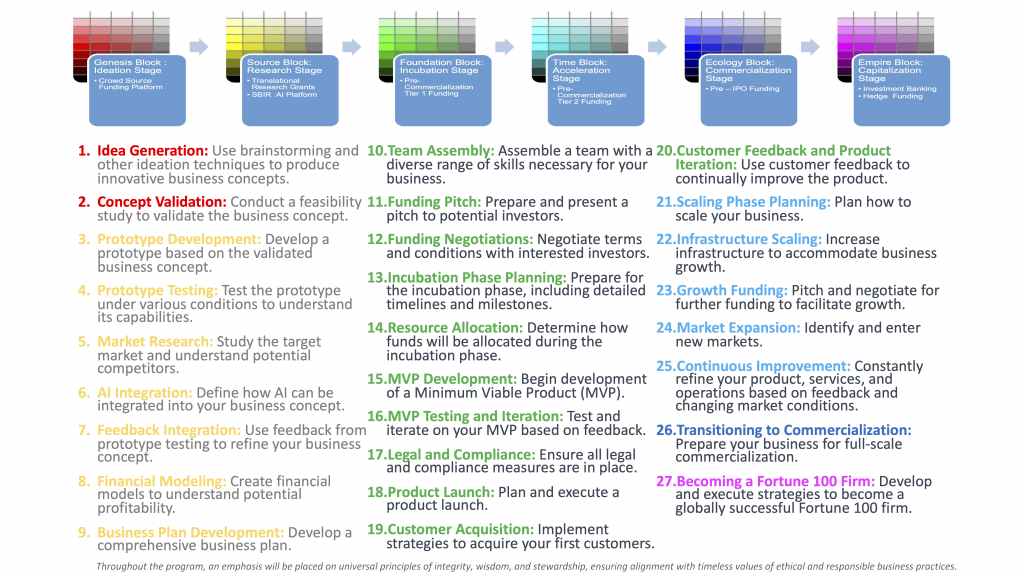The Wealth Ecology Model (Patent Pending)

Overview of the 27 Modules: Inventor and Principal Investigator – Dr. Oliver E. Jones
The 27 modules of the Wealth Ecology Model are designed to form a comprehensive guide for taking an idea from conception to becoming a globally successful Fortune 100 firm. These modules are strategically segmented to cover various aspects of business development and management, embracing advanced concepts such as AI and Blockchain. Here’s an overview of the modules:
Phase I: Conception and Development
- Idea Generation: Brainstorming innovative business concepts.
- Concept Validation: Conducting feasibility studies to validate ideas.
- Prototype Development: Creating a prototype, using AI-enabled mock-ups.
- Prototype Testing: Testing the prototype under various conditions.
Phase II: Market Analysis
- Market Research: Utilizing AI for market analysis and competitor insights.
- AI Integration: Defining how AI can be integrated into the business concept.
Phase III: Refinement and Planning
- Feedback Integration: Using prototype testing feedback to refine the concept.
- Financial Modeling: Creating financial models for potential profitability.
- Business Plan Development: Crafting a comprehensive business plan.
- Team Assembly: Forming a skilled team for your business.
Phase IV: Funding and Incubation
- Funding Pitch: Preparing a pitch for potential investors.
- Funding Negotiations: Discussing terms with interested investors.
- Incubation Phase Planning: Planning the incubation phase, including milestones.
- Resource Allocation: Allocating funds during the incubation phase.
Phase V: Product Development
- MVP Development: Developing a Minimum Viable Product.
- MVP Testing and Iteration: Iterative testing and refinement of MVP.
Phase VI: Legalities and Launch
- Legal and Compliance: Ensuring legal compliance.
- Product Launch: Planning and executing a product launch.
Phase VII: Growth and Customer Engagement
- Customer Acquisition: Implementing strategies for customer acquisition.
- Customer Feedback and Product Iteration: Continual product improvements.
- Scaling Phase Planning: Planning business scaling strategies.
Phase VIII: Scaling and Expansion
- Infrastructure Scaling: Expanding infrastructure for growth.
- Growth Funding: Securing further funding for growth.
- Market Expansion: Identifying and entering new markets.
Phase IX: Continuous Improvement and Global Success
- Continuous Improvement: Constant refinement of products and operations.
- Transitioning to Commercialization: Preparing for full-scale commercialization.
- Becoming a Fortune 100 Firm: Developing strategies for global success.
This modular approach ensures a systematic progression through key stages of business development, with particular emphasis on modern technological integration points such as AI and Blockchain. It’s a patent-pending roadmap designed to be adaptable, allowing entrepreneurs to navigate the multifaceted journey from an initial idea to a globally thriving enterprise – Dr. Oliver Jones.

